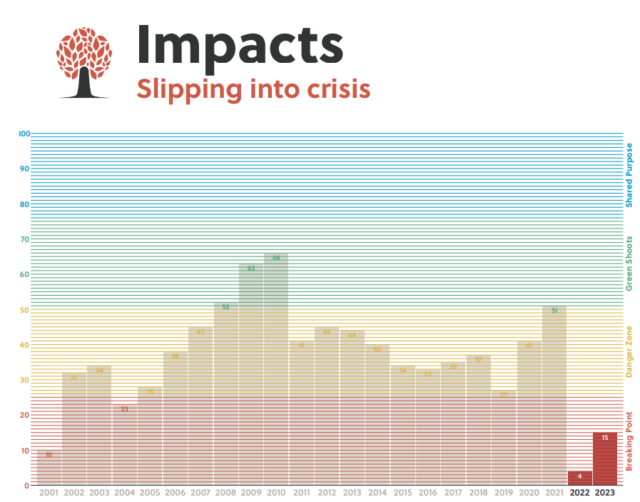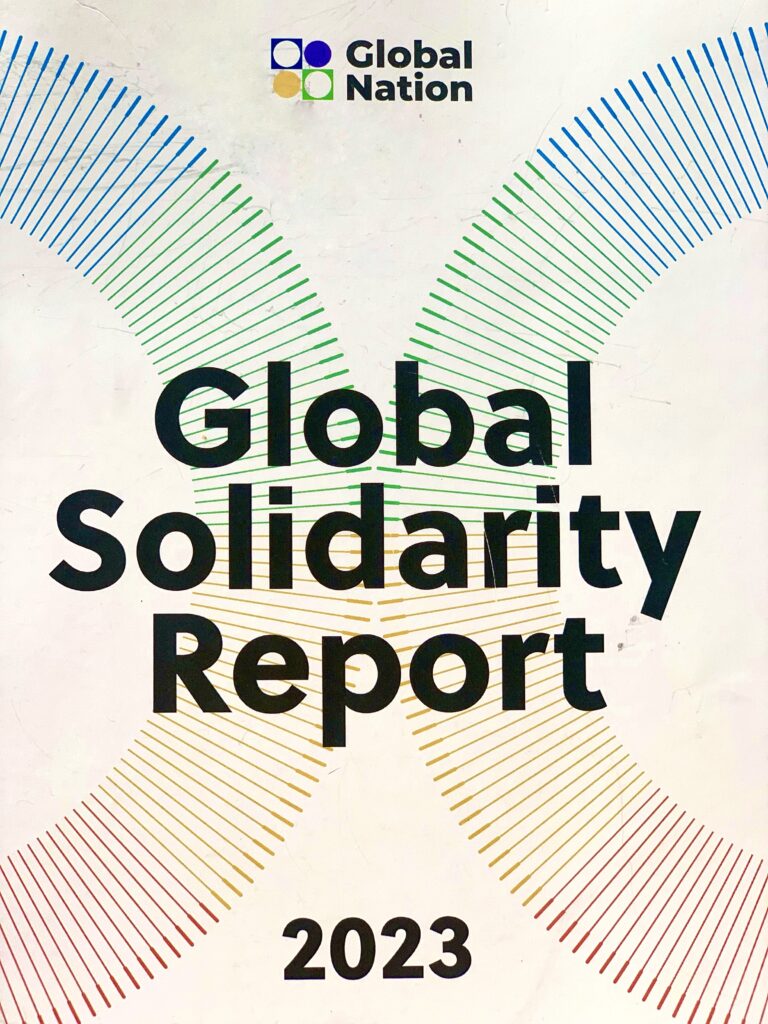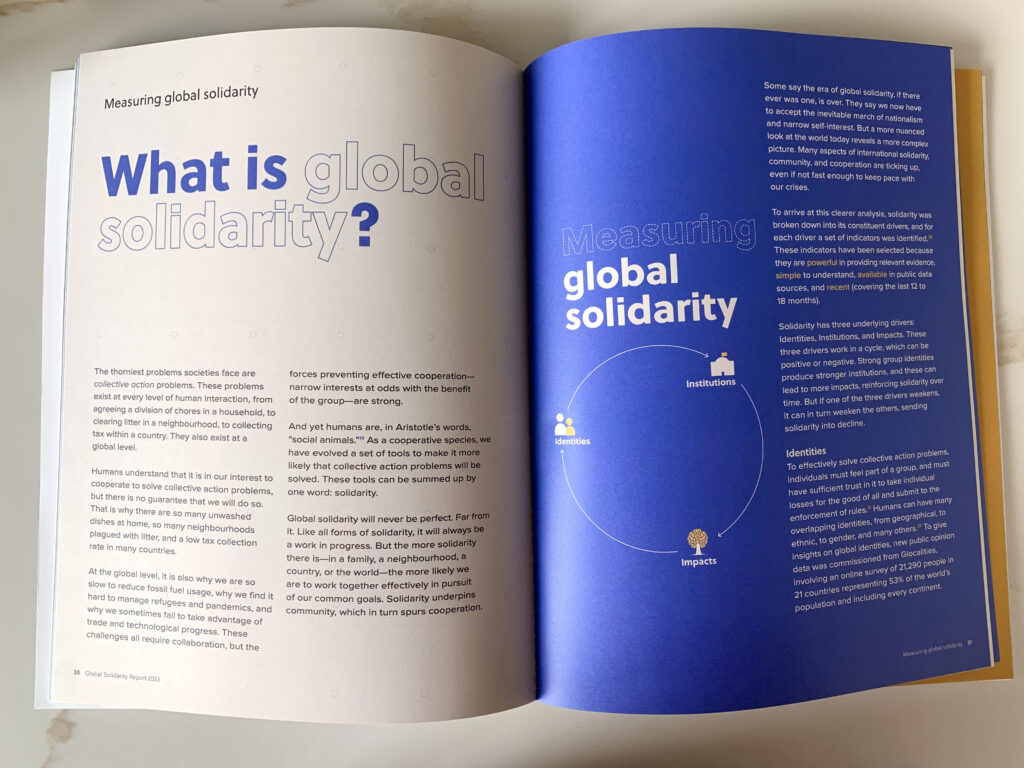Has Global Solidarity Entered a “Danger Zone”?
The current state of the world is marked by a series of global crises that leave communities in distress and force individuals to fend for themselves. Have these challenges only disrupted the international order, or they led societies to unite like never before? The findings of the first-ever data-driven study on global solidarity serve as a warning that global support may continue to plummet as institutions cannot deliver on collective action problem-solving.

Impacts of Global Solidarity have reached their lowest levels in the last two years. Graphic Credit: Global Solidarity Report.
When global crises leave communities distressed, the appeal for humanitarian aid and support reverberates beyond national borders. But is there anyone to answer on the other side?
The resilience of the international community and its strength in fostering global support was measured for the first time using data-based insights in the Global Solidarity Report published on Sept. 13, 2023. As world leaders gathered in New York City for the United Nations General Assembly under the theme of “Rebuilding trust and reigniting global solidarity,” a launch event for the report brought together experts and contributors to discuss the findings casting a light on the strengths and weaknesses of the international community.
The report is an initiative of Global Nation, a think tank promoting an internationalist global future, with the support of the Bill and Melinda Gates Foundation. It was created in partnership with Global Citizen (an international education and advocacy organization), Glocalities (an international market research agency), and NYU’s Center on International Cooperation, among others. The findings place the world in the so-called “danger zone,” basing the score on 11 indicators within three categories – identities, institutions, and impacts.
“Whatever solidarity we have mastered to date, it’s not working,” said Hassan Damluji, a co-founder of Global Nation and report contributor.
During the launch event, the panel raised discussions about people needing more courage to show compassion and support to those in need. However, the existence of deep-seated inequalities that divide society causes the breakdown of the sense of a common cause altogether.
One of the panelists, Chikwe Ihekweazu, Assistant Director General at the World Health Organization (WHO) for Health Emergency Intelligence and Surveillance Systems, suggested that the approach is fundamentally wrong – societies are solving the same issues, but one country at a time. In contrast, a collaborative approach would be much more efficient and effective in fighting these challenges.
“Shared solidarity also relates to shared vulnerability,” he added.
According to Harold E. Doley, III, an international financier and business developer with a background in smaller developing markets in Africa, the Caribbean, and Central America, there is “a lack of civility” between people as they are unable to listen and respect each other’s differences. He is hopeful that people easily come together around recreational activities like sports, which leaves the task of replicating this on a wider scale on issues of global relevance.



Photo Credit: Viktoria Ivanova, JPI.
However, while the report places the overall findings in the “danger zone,” it turns out that institutions might be the ones failing society when it comes to global solidarity. The analysis of the public attitudes in the Global Solidarity Report suggests a positive trend where the most significant number of people is measured to want more collaboration in solving collective action problems. This, according to Hassan Damluji, is the most pivotal finding of the report that people should remember.
“The one consensus of the story is that the global public is way ahead of their leaders in feeling solidarity. Institutions have not yet stepped up to that demand and the result is the impact of our cooperation spiraling out of control,” he said.
Experts in the report suggest the need for a massive institutional response to match people’s inherent feel for solidarity. However, it seems that the situation for most societies in the world is a lack of leadership that can facilitate enough local and global cooperation. According to Dr. Maha Hosain Aziz, NYU professor and expert in political risk, the post-Cold War era was supposed to drive people to embrace each other’s differences, unite, and protect human rights. Yet, a wave of hate and extremism is the reality that followed.
“It boils down to the decline of legitimacy of Western leadership to dictate our shared values and influence us to turn away from the hate. I would imagine that going forward a lot of the hate that we see will be further accelerated by other tools like generative AI,” she said.
As the approach of the world’s current leaders seems to be failing, non-state actors will play an increasing role in shaping attitudes. According to Dr. Maha Aziz, activist groups, the private sector, and even some individuals like billionaires can influence policy in a way that may not necessarily be great for democracy but could lead global society in the fight against hate and extremism.
In much of the same spirit, the intended audience of the Global Solidarity Report, according to Hassan Damluji, is within five categories of people. Those include the media, who can bring issues to a wider audience, civil society, the private sector, international institutions and the so-called early adopter politicians, who can be the voices within governments carrying progressive influence.
“If we can’t reach the whole world, but we can get this point across to these five groups of people, then they can hopefully reach the whole world,” Hassan Damluji said.
The findings of the first-ever data-driven study on global solidarity serve as a warning that global support may continue to plummet as institutions are unable to deliver on collective action problem-solving. This has led to the impacts of global cooperation being at their lowest and most worrisome in decades. However, the Global Solidarity Report emphasizes the public’s support and preparedness to exercise solidarity. We may be wrong in reaching an overly pessimistic consensus on the strength of global solidarity after all.
Viktoria Ivanova (she/her) is the current Deputy Editor-in-Chief of the Journal of Political Inquiry (JPI). She is a first-year Master’s student at NYU, pursuing a degree in Global Journalism. She holds a Bachelor’s degree with a double major in Journalism and Political Science, combined with a minor in History, from the American University in Bulgaria (AUBG). For her senior thesis, she explored the topic of “Extralegal tools for co-opting the media: a study of the Bulgarian media environment,” uncovering some of the primary challenges to media freedom in her home country. Viktoria has also worked on articles analyzing the impact of the COVID-19 pandemic on the experiences of Bulgarian university students. During her undergraduate years, she served as the Editor-in-Chief and later as the President of her university newspaper, AUBG Daily. At NYU, she aspires to delve into complex international issues and create in-depth pieces, accessible to a broader audience.




